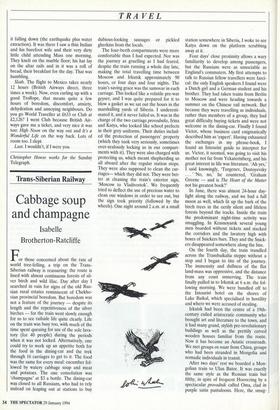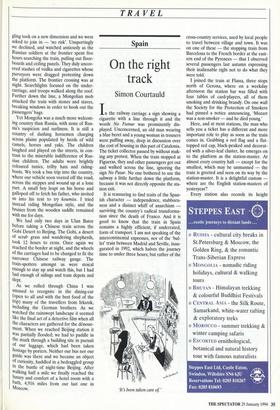'Frans-Siberian Railway
Cabbage soup and champagne
Isabelle Brotherton-Ratcliffe
For those concerned about the rate of world tree-felling, a trip on the Trans- Siberian railway is reassuring: the route is lined with almost continuous forests of sil- ver birch and wild lilac. Day after day I searched in vain for signs of the old Rus- sian rural estates reminiscent of Chekho- vian provincial boredom. But boredom was not a feature of the journey — despite its length and the repetitiveness of the silver birches — for the train went slowly enough for us to see railside life quite clearly. Life on the train was busy too, with much of the time spent queuing for use of the sole lava- tory (for 40 people) during the periods when it was not locked. Alternatively, one could try to work up an appetite both for the food in the dining-car and the trek through 16 carriages to get to it. The food was the same for every meal: cucumber fol- lowed by watery cabbage soup and meat and potatoes. The one consolation was `champagne' at $3 a bottle. The dining-car was closed to all Russians, who had to rely instead on leaping out at stations to buy
dubious-looking sausages or pickled gherkins from the locals.
The four-berth compartments were more comfortable than I had expected. Nor was the journey as gruelling as I had feared, despite the train running a whole day late, making the total travelling time between Moscow and Irkutsk approximately 90 hours, or four days and four nights. The train's saving grace was the samovar in each carriage. This looked like a volatile pre-war geyser, and I was quite prepared for it to blow a gasket as we sat out the hours in the marshalling yards of Siberia. I underesti- mated it, and it never failed us. It was in the charge of the two carriage provodniks, Irina and Katya, who looked like school prefects in their grey uniforms. Their duties includ- ed the protection of passengers' property (which they took very seriously, sometimes over-zealously locking us in our compart- ments with it). They were also charged with protecting us, which meant shepherding us all aboard after the regular station stops. They were also supposed to clean the car- riages— which they did not. They were bet- ter at cleaning the train's exterior sign, `Moscow to Vladivostok'. We frequently tried to deflect the use of precious water to clean our windows in order to see out, but the sign took priority (followed by the wheels). One night around 2 a.m. at a small
station somewhere in Siberia, I woke to see Katya down on the platform scrubbing away at it.
Four days' close proximity allows a wary familiarity to develop among passengers, but the Russians were as unsociable as England's commuters. My first attempts to talk to Russian fellow travellers were farci- cal: the only English speakers I found were a Dutch girl and a German student and his brother. They had taken trains from Berlin to Moscow and were heading towards a summer on the Chinese rail network. But because they were travelling as individuals, rather than members of a group, they had great difficulty buying tickets and were not welcome in the dining-car. Finally I found Victor, whose business card enigmatically described him as 'expert'. Having exhausted the exchanges in my phrase-book, I found an Intourist guide to interpret for us. Victor, it seemed, was going to visit his mother not far from Yekaterinberg, and his great interest in life was literature. `Ah yes,' I said knowingly, `Turgenev, Dostoyevsky
. "No, no,' he countered, 'Graham Greene — and is The Heart of the Matter not his greatest book?'
In June, there was almost 24-hour day- light along the railway, and we had a full moon as well, which lit up the bark of the birch trees in the eerily silent and lifeless forests beyond the tracks. Inside the train the predominant night-time activity was smuggling. In Krasnoyarsk several young men boarded without tickets and stacked the corridors and the lavatory high with boxes of Snickers bars. They and the Snick- ers disappeared somewhere along the line.
On the fourth day, the train trundled across the Transbaikalia steppe without a stop and I began to tire of the journey. The immensity and dullness of the flat land-mass was oppressive, and the distance from any coast unnerving. The train finally pulled in to Irkutsk at 6 a.m. the fol- lowing morning. We were bundled off to the Intourist hotel on the shores of Lake Baikal, which specialised in hostility and where we were accused of stealing.
Irkutsk had been the centre of a 19th- century exiled aristocratic community who brought art and literature to the town, and it had many grand, stylish pre-revolutionary buildings as well as the prettily carved wooden houses familiar from the route. Now it has become an Asiatic crossroads. We met groups en route from China, groups who had been stranded in Mongolia and nomadic individuals in transit.
After two days' rest we boarded a Mon- golian train to Ulan Bator. It was exactly the same style as the Russian train but filthy, in spite of frequent Hoovering by a spectacular provodnik called Oma, clad in purple satin pantaloons. Here, the smug-
TRAVEL
gling took on a new dimension and we were asked to join in — 'no risk'. Unsportingly we declined, and watched anxiously as the Russian soldiers at the frontier spent five hours searching the train, pulling out floor- boards and ceiling panels. They duly uncov- ered stashes of vodka and cigarettes whose purveyors were dragged protesting down the platform. The frontier crossing was at night. Searchlights focused on the under- carriage, and troops walked along the roof. Further down the line, a Mongolian mob attacked the train with stones and staves, breaking windows in order to hook out the passengers' bags.
Yet Mongolia was a much more welcom- ing country than Russia, with none of Rus- sia's suspicion and surliness. It is still a country of dashing horsemen charging across plains populated by herds of wild camels, horses and yaks. The children laughed and played on the streets, in con- trast to the miserable indifference of Rus- sian children. The adults wore brightly coloured tunics, trilby hats and riding- boots. We took a bus trip into the country, where our vehicle soon veered off the road, across the steppes and wound up at a lone yurt. A small boy leapt on his horse and galloped off to fetch his father, who invited us into his tent to try koumiss. I tried Instead riding Mongolian style, and the bruises from the wooden saddle remained with me for days.
We had only two days in Ulan Bator before taking a Chinese train across the Gobi Desert to Beijing. The Gobi, a desert of scrub grass and wandering shepherds, took 12 hours to cross. Once again we reached the border at night, and the wheels of the carriages had to be changed to fit the narrower Chinese railway gauge. The train-spotters amongst us were stoical enough to stay up and watch this, but I had had enough of sidings and train depots and slept.
As we rolled through China I was amused to recognise in the dining-car (open to all and with the best food of the trip) many of the travellers from Irkutsk, including the German brothers. As we
watched the rainswept landscape it seemed like the final act of a detective film when all the characters are gathered for the denoue- ment. When we reached Beijing station it was partially flooded; we had to paddle in the murk through a building site in pursuit of our luggage, which had been taken hostage by porters. Neither our bus nor our
guide was there and we became an object of curiosity, huddled in a bedraggled group In the bustle of night-time Beijing. After
walking half a mile we finally reached the luxury and comfort of a hotel room with a bath, 4,916 miles from our last one in Moscow.



































































 Previous page
Previous page